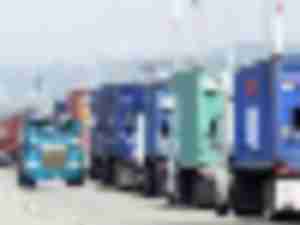Terminal Velocity – Automation in America
\As ocean carriers strive for greater productivity and less dwell time, terminal operators look toward automation as an answer to the question "How do I get containers in and out of my gates faster?"
Don’t be fooled by VGM Look alikes
There's been so much written lately about SOLAS container weight verification (Verified Gross Mass or VGM) that it almost seems I am beating a dead, well you get the point.
VGM much to do about Intermodal Cargo
I’d love to jump on the one size fits all bandwagon and tell you rail recorded weights will be used by the ocean terminal to verify inbound containers but that’s simply not true.
From Across the Pond: The Exit - Brexit Over and Exit Strategy begins
Early Friday morning (24-June) the U.S. awoke to the results of Britain’s historic vote to leave the European Union. On the western shores of “The Pond” the controversial referendum was often buried in the electric ether of the U.S. Presidential campaign or more exciting issues like keeping up with another generation of Kardashians. However, with the “shocking decision” (an expression used by at least a dozen U.S. news reporters) “The Exit” is today’s news.
Berth right: NOL-APL acquisition’s domino effect on alliances
With last month’s EC (European Commission) approval the remaining step in the privatization of NOL-APL is now for CMA CGM to buy outstanding shares (up to 90%) of NOL’s total stock.
From Road to Ramp in half the time - BNSF RailPass
The BNSF Railway has rolled out an integrated dispatch system for pickup and delivery of ocean containers and domestic equipment at their major intermodal facilities.
Transportation at what cost?
We always seem to forget the effect operating cost has on the supply chain. With fuel and transport rates forever in flux and on our radar, we tend to overlook the less noticeable “costs of doing business” that are not always measured in dollar values. These manifest themselves in port delays and increased transit time.
Teamsters Call On Ports Of LA/Long Beach To Ban Trucking Companies Who “Misclassify” Drivers
Fred Potter, director of the Teamsters Union Port Division, in an interview with AJOT said the Teamsters are calling on the Ports of Los Angeles and Long Beach to “ban trucking companies from Port property when they illegally misclassify truck drivers” as independent contractors.
Brussels Airport Limps Slowly on Road to Recovery After March 22 Deadly Attacks
Things had been looking pretty well earlier this year for Brussels Airport which was moving towards realizing its management’s vision to someday transform the airport into a hub despite the fierce competition from other European airports that are already far ahead of Brussels in terms of passenger and cargo volumes.
Broad coalition files suit against U.S. Coast Guard for drastic Great Lakes pilotage fee increase
As largely anticipated, a legal challenge has been mounted by a broad coalition of U.S. Great Lakes ports, foreign-flag carriers and maritime trade associations in Canada and the United States against the U.S. Coast Guard’s recent decision to dramatically increase Great Lakes. pilotage rates.
© Copyright 1999–2024 American Journal of Transportation. All Rights Reserved










